Libya deadline runs out
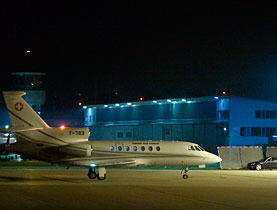
A 60-day limit for normalising relations between Switzerland and Libya ends on Tuesday, with no sign yet of the two Swiss hostages held by Tripoli.
Experts say Switzerland needs to carefully analyse its next steps in the Libya dispute, which arose after Libyan leader Moammar Gaddafi’s son was arrested in Geneva last year.
A Swiss delegation, led by a high-ranking foreign ministry official, arrived back from Tripoli on Monday evening. It was not accompanied by the two Swiss businessmen, who have been held in Libya for more than one year.
The foreign ministry said in a statement on Monday evening that the trip was part of an agreement to normalise relations between Bern and Tripoli. It has not given any further information and the fate of the two hostages is not known.
Tuesday marks the end of a deadline for normalising relations, set in an accord signed on August 20 by the two countries during a visit by Merz to Tripoli. It was at this point that Merz – controversially for some – apologized to Libya for the arrest of Gaddafi’s son.
Switzerland and Libya also agreed to appoint arbitrators for an international tribunal which is due to examine the circumstances surrounding the arrest.
Geneva police detained Hannibal Gaddafi in July 2008 on charges of mistreating his servants. Although the servants have since withdrawn their charges and have been compensated, Libya has taken a number of retaliatory measures, including revoking exit visas for two Swiss nationals.
Merz originally believed that the two men would be released by September 1. Hopes were then pinned on the October deadline.
Careful analysis
Geri Müller, president of the Swiss foreign affairs committee, said that the return of the Swiss delegation from Tripoli meant that a careful analysis of the situation was now needed.
In the past few weeks it was “not as if nothing had happened” he told Swiss public radio on Tuesday morning, referring to the talks that had occurred.
“It is important that we know exactly what happened during the last negotiations with the Libya task force,” Müller said.
A “careful plan” then needed to be drawn up for the next steps, but he warned against breaking diplomatic relations. “Without this nothing is likely to happen,” he said, adding that it was now up to the Libyans to act.
Merz ‘s tactics over Libya were defended by Müller. It was important for Switzerland to be seen to speak with one voice, he said.
Deadline questions
For her part, human rights and international law expert Helen Keller has raised questions about the 60-day deadline running out on Tuesday.
The Zurich University professor and member of the United Nations’ Human Rights’ Committee said that from the accord, the limit could be understood as beginning at the same time as the international tribunal on Hannibal’s arrest.
This is completely different to how it has been interpreted so far in Switzerland, she said in an interview on public radio.
She also underlined the difficulty of taking measures that would shake bilateral relations with Libya, such as making the Libyan ambassador a persona non grata. “One has to realize that this would result in an immediate reaction from the Libyan side,” said Keller.
It would also mean relying on a third nation to represent Swiss interests, which at the moment only the United States seems ready to do. Given the rocky relations between Washington and Tripoli, this was not an ideal situation, she added.
swissinfo.ch
In a previous diplomatic spat in 1997 Tripoli banned Swiss citizens from entering Libya to protest against Switzerland’s refusal to grant a student visa to a son of Gaddafi.
In return the Swiss authorities tightened entry regulations for Libyan citizens. The conflict was solved in April 1998.
Political contacts between the two countries returned to normal after the UN-imposed sanctions were lifted in 2003.
Libya is one of Switzerland’s five key export markets on the African continent and was its main supplier of crude oil before economic relations were interrupted.
Libya provided about 50% of Swiss crude oil imports and had assets worth SFr6.5 billion in Swiss banks in 2007.
Swiss exports in 2007, mainly in the watchmaking and machinery as well as the pharmaceutical industries, rose 16.3% to SFr278.6 million.

In compliance with the JTI standards
More: SWI swissinfo.ch certified by the Journalism Trust Initiative

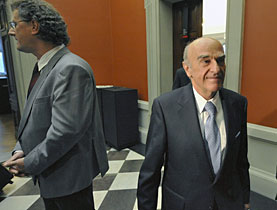
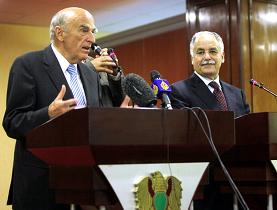
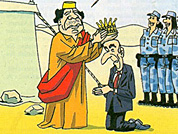
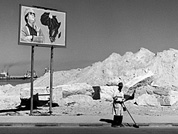
You can find an overview of ongoing debates with our journalists here. Please join us!
If you want to start a conversation about a topic raised in this article or want to report factual errors, email us at english@swissinfo.ch.